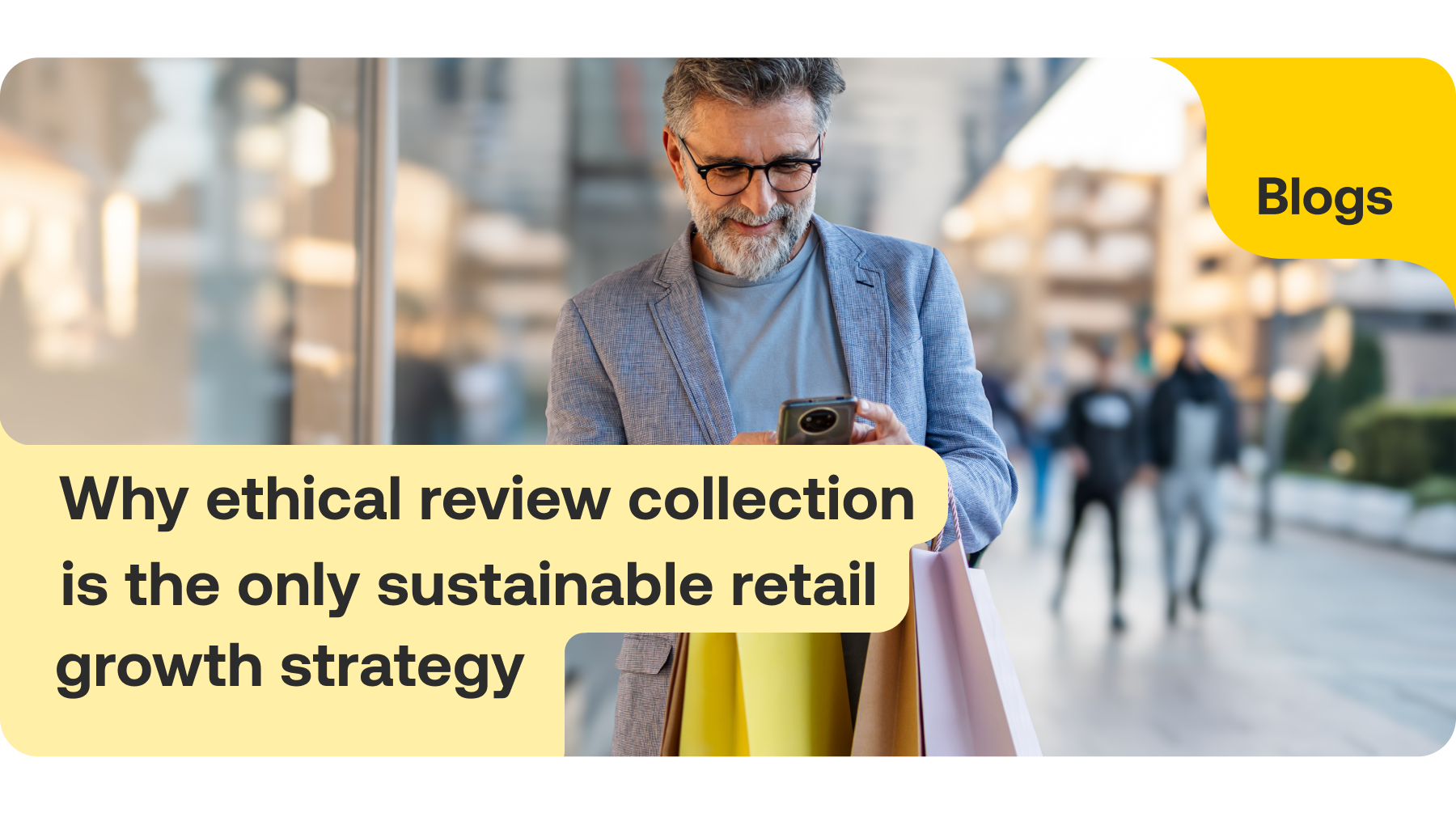Which? recently published a report on Tackling Fake and Misleading Reviews, and as industry experts, they consulted with us in compiling it.
In this short article, we’re talking to Feefo’s Kim Burgess, Chief Customer Officer, to get her overview of the report and thoughts on what it means for consumers and businesses.
-min-1.png)
Q. The Which? report, as its name explicitly states, is about tackling the problem of fake and misleading reviews. Why is this so important?
A. Let me give you a few figures from research we commissioned, alongside some other facts and figures that put this issue into context. A huge 96% of people read reviews before they make a purchase. But only 8% say they could spot a fake review. That leaves a lot of people who could be misled by untrue reviews. In fact, our research shows that over a quarter of consumers (27%) have been deceived by fake reviews. And 70% of consumers want the Government to act urgently to stop fake reviews that could lead them to buy inferior or unsafe products. They also have a massive impact on the economy. In 2021, We Forum estimated they cost the UK $2.3 billion and the global economy $152 billion.
Q. The report looks at the different types of review providers. Do they all have the same issues?
A. Obviously, the common problem is how to stop fake reviews from appearing on their sites. However, some take this more seriously than others. Which? highlights how different providers operate in different ways.
It strongly states each should assess the risks its model presents when it comes to eliminating fake reviews and cutting potential harm to the public. As a consumer champion, this is a great stance for Which? to take. But we mustn’t forget the impact these fakes can have on businesses, too.
Our research showed that 40% of SME owners have been negatively impacted by fake reviews, with knock-on effects to their business. How? Some companies have fake reviews posted about them by competitors to harm their reputations. Others suffer by developing their business strategies on insights that are less than true because of the fake review data they’re based on.
Q. The report calls on the Government and the Competition and Markets Authority (CMA) to do more to stop fake and misleading reviews. Do you agree such dramatic steps are needed?
A. Yes – emphatically. We need to protect the public and reputable companies from the impacts of these reviews. Each provider can take its own steps to stop fake reviews. But the buying and selling of fake reviews is now a big business. So, the industry needs the power of big deterrents to stamp it out. If it means facing criminal charges and fines for firms that sell reviews and those that host fake reviews on their sites, we’re fully behind such measures. That’s how much we care about our industry’s good name and future.
Q. Are all fake reviews the same?
A. Unfortunately, no. If they were, it might make them easier to stop. The Which? report rightly divides the problem into two main categories.
You have the out-and-out fakes where the ‘reviewer’ hasn’t used the product or service at all. On the whole, these are used by businesses wanting to promote their company and get consumers to use their products or services based on untrue feedback. In some instances, they can be posted by companies or individuals to harm the reputation of competitors, though.
If you’re in the first group above, you could face fines of up to 10% of your revenue if you’re caught using fake reviews.
Should you be in the second group and a victim of fake reviews, don’t hesitate to contact the company displaying the review. Explain why you think it’s untrue and that it needs to take all reasonable steps to eliminate fakes. Also, point out that if it doesn’t remove the review, you’ll contact the CMA, and it could be fined.
Then you have misleading reviews. These either come from people that have been incentivised in some way to use a product or service and then rate it highly – no matter what they actually felt. Or they can be in the form of genuine reviews that have been manipulated in some way, such as adding inappropriate reviews to a product to boost its overall rating. For example, including genuine five-star ratings for a dog food to poorer reviews for a kennel to give it a better total score.
Q. Which? spends a lot of time focussing on risk assessment. Do you agree this is important for all providers?
A. As the report points out, the risks to consumers and businesses when it comes to fake reviews are very high. So, we absolutely agree that risk assessments are vital. And for some, they’re more important than others.
For a risk assessment to be effective, it’s got to look at the review company and its way of working. It then needs to examine the ways the design of its platform could be misused. Consider open review platforms, where anyone can say what they want even if they’ve not interacted with a company. If ongoing risk assessments aren’t mandatory for these businesses, how can they guarantee fakes aren’t getting through? They can’t.
So, again, you could report them for not taking the steps needed to stop fake reviews about your business appearing on their platforms.
Risk assessments should be ongoing, too. Our business model stops the issue of fake reviews by only inviting verified customers who have bought or used a product or service. As a responsible company, we still take measures to continually assess our processes to make sure that they can’t be breached – especially when we’re developing new ones.
In our opinion, it's important that risk assessment findings and the risks that come with certain methods of gathering reviews aren’t hidden away. If providers aren’t upfront about the steps they take to minimise the risk of fakes, consumers and businesses should treat their reviews with a pinch of salt.
Q. The report examines what can be done to stop fake reviews pre-and post-publication. What are Feefo’s thoughts on this?
A. Obviously, if you can stop a fake review about your business from being published, that’s ideal. It won’t be seen and can’t cause any issues. But the way some providers’ models are set up can make this virtually impossible. So, ways of dealing with reviews post-publication are essential, also.
As mentioned, making sure customers are 100% verified is the best way to prevent fake reviews. It stops them from being seen and having any impact on customers or businesses. But there are different ways of verifying customers - some more robust than others. Certain companies just want to confirm the reviewer is a person and not a bot, so take email addresses, for example, as confirmation. Others use things such as two-factor authentication. For us, it’s only inviting people who’ve actually bought something that guarantees they’re verified.
With different businesses using different verification methods, we agree with Which? that companies need to be upfront about how they verify reviews. We are. Review providers that don’t or those that include a mix of verified and unverified reviews on their sites should be considered as potentially compromised by fakes.
Q. The Which? paper spends a lot of time on content moderation – pre-and post-publication. What’s the value of content moderation, and does it work?
A. When a platform has decided if someone should be allowed to leave a review, the next step it needs to take is to check what the review is saying – preferably before it’s published. This is where content moderation comes into play. It isn’t about filtering reviews so only the ‘good’ ones appear. It’s all to do with using both automated systems and human checks to spot fake and misleading reviews and other things, such as personal details that shouldn’t be shared.
Generally, the larger platforms use automated systems that work by using machine learning to either remove or highlight reviews to be moderated by a human if needed. Smaller platforms mostly rely on human moderators or less sophisticated automated systems.
As Which? points out moderation techniques aren’t 100% effective. It proved this by taking reviews on Google Play and the App Store and running them through its moderation procedures. It found obvious fake review activity that had gotten through the moderation of both sites.
In terms of post-publication moderation, the larger and the more professional providers offer ways for people and businesses to report potential fake and misleading reviews. Any reported reviews can then be examined either automatically or by the human eye. The lessons learned can then help create new solutions to fix the problem. So don’t hesitate to act if an untrue review about your business is on a provider’s site.
If you’re in the market for a review company, take a hard look at its moderation techniques. While they may be a weaker second line of defence overall, a business that invests time and money in moderation shows it is serious about tackling fake and misleading reviews.
Q. When it comes to review manipulation, Which? says automated systems have problems stopping them. What’s Feefo’s stance on that?
A. Things like review merging, where reviews are used from other products or services to increase another’s score, don’t happen with Feefo because of our invite-only model. All providers should be risk assessing their systems to spot where this type of abuse can happen.
That brings me to some things that we believe in very strongly at Feefo – auditing and continuous improvement.
Someone will always look for ways to get one over your systems. So, our starting point is always, ‘How can we fool our systems?’. If we find a way, we fix it. If we don’t, we’ll keep on looking.
Ask any review company you’re thinking of working with about its auditing and improvement processes - in detail. If you aren’t convinced it’s doing enough, look elsewhere. Look to us.


.png)
